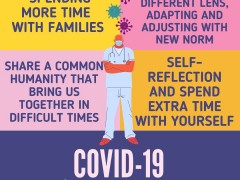News

COVID-19: A BLESSING IN DISGUISE
Date : 11 August 2021
Reported by : Ahmad Izzuddin
Category : News
Tweet This
In the annals of medicine, the year 2020 will go down in history as a watershed moment. The medical community faced enormous upheavals and challenges as a result of a pandemic of historic proportions not seen in 100 years. In 2020 a significant threat to public health emerged all around the world. The novel severe acute respiratory syndrome coronavirus 2 (SARS-CoV-2) epidemic outbreak emerged in December 2019 from Wuhan City, China and spread to the rest of the world. The World Health Organization (WHO) has called this disease as COVID-19.
When a global state of emergency was declared due to the pandemic in March 2020, many unprepared businesses were confronted with the problem of immediately re-adapting their Business Continuity plan if they were to stay on schedule. Many companies had no choice but to adopt remote working methods as their lifelines to maintain the “business as usual” scenario in the midst of the crisis. However, out of every crisis there is an opportunity for growth, to look at issues with a different lens, adapting and adjusting, and in fact refocusing on the way we operate our daily routine. We can relearn to appreciate what we should have known all along but previously neglected. Crisis can provide us with an opportunity to perceive our surroundings and ourselves in new ways, to live more honestly, to change, and to see our profession and the world around us with new eyes. COVID-19 is unquestionably one of humans’ deadliest diseases. It continues to have a devastating impact on people's lives and livelihoods all across the world.
The majority of the conversations center on the fear of contracting the infection, living in houses, overcrowded facilities, and shutdowns of all kinds. However, in the middle of the hardship, there is a bright side of the COVID-19 epidemic. As a result of COVID-19 global reach, governments that have been affected have either declared a state of emergency or enforced harsh restrictions. Everyone needed to restrict their movements and stay at home. As a result, physical distance and working from home are practiced. It aimed at limiting coronavirus transmission and perhaps, ostracizing COVID-19 as a cause of death. These shifts have also resulted in some unexpected outcomes; the epidemic has also produced some positive outcomes such as there are good impacts on reduced vehicle traffic and road traffic accidents, as well as lower levels of air pollution, which could possibly lead to lower heart attack rates and a more rejuvenated environment. In most regions, crime rates have decreased. The COVID-19 epidemic has also had a good impact on community action, family communication, behaviour, sanitation, cleanliness, as well as online and remote education. COVID-19 can be viewed as a boon for living beings, despite being a scourge for humans. With the careful usage of petrochemical compounds, ecosystems and elements have been purified. It is a blessing in and of itself to be able to breathe fresh air and drink purified water.
Hence, the spread of the Coronavirus made many individuals realize that they all share a common humanity that brings them together in difficult times. Some offered to go grocery shopping for the elderly and disabled. Our societal "distancing" is, ironically, a kind of oneness — an ethical form of collective action geared at halting the expansion. Now is the time for humans to be considerate of all the gifts that Nature has bestowed upon them. This kind and compassionate way of life will provide hope for a healthy, stress-free life.
By : Sr. Najwa Hidayah Nordain, Internship student









